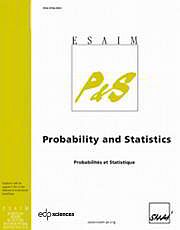Crossref Citations
This article has been cited by the following publications. This list is generated based on data provided by
Crossref.
Di Bernardino, Elena
and
Prieur, Clémentine
2014.
Estimation of multivariate conditional-tail-expectation using Kendall's process.
Journal of Nonparametric Statistics,
Vol. 26,
Issue. 2,
p.
241.
Cousin, Areski
and
Di Bernardino, Elena
2014.
On multivariate extensions of Conditional-Tail-Expectation.
Insurance: Mathematics and Economics,
Vol. 55,
Issue. ,
p.
272.
Fernández Sánchez, Juan
and
Trutschnig, Wolfgang
2015.
Conditioning-based metrics on the space of multivariate copulas and their interrelation with uniform and levelwise convergence and Iterated Function Systems.
Journal of Theoretical Probability,
Vol. 28,
Issue. 4,
p.
1311.
Di Bernardino, Elena
Laloë, Thomas
and
Servien, Rémi
2015.
Estimating covariate functions associated to multivariate risks: a level set approach.
Metrika,
Vol. 78,
Issue. 5,
p.
497.
Bernardino, E. Di
and
Palacios‐Rodríguez, F.
2016.
Estimation of extreme quantiles conditioning on multivariate critical layers.
Environmetrics,
Vol. 27,
Issue. 3,
p.
158.
Beck, Nicholas
and
Mailhot, Mélina
2018.
A consistent estimator to the orthant-based tail value-at-risk.
ESAIM: Probability and Statistics,
Vol. 22,
Issue. ,
p.
163.
Herrmann, Klaus
Hofert, Marius
and
Mailhot, Mélina
2018.
Multivariate geometric expectiles.
Scandinavian Actuarial Journal,
Vol. 2018,
Issue. 7,
p.
629.
Di Bernardino, Elena
and
Prieur, Clémentine
2018.
Estimation of the multivariate conditional tail expectation for extreme risk levels: Illustration on environmental data sets.
Environmetrics,
Vol. 29,
Issue. 7,
Prékopa, András
and
Lee, Jinwook
2018.
Risk tomography.
European Journal of Operational Research,
Vol. 265,
Issue. 1,
p.
149.
Coblenz, Maximilian
Dyckerhoff, Rainer
and
Grothe, Oliver
2018.
Confidence Regions for Multivariate Quantiles.
Water,
Vol. 10,
Issue. 8,
p.
996.
Coblenz, M.
Dyckerhoff, R.
and
Grothe, O.
2018.
Nonparametric estimation of multivariate quantiles.
Environmetrics,
Vol. 29,
Issue. 2,
Dau, Hai Dang
Laloë, Thomas
and
Servien, Rémi
2020.
Exact asymptotic limit for kernel estimation of regression level sets.
Statistics & Probability Letters,
Vol. 161,
Issue. ,
p.
108721.
Herrmann, Klaus
Hofert, Marius
and
Mailhot, Mélina
2020.
MULTIVARIATE GEOMETRIC TAIL- AND RANGE-VALUE-AT-RISK.
ASTIN Bulletin,
Vol. 50,
Issue. 1,
p.
265.
Torres, Raúl
Di Bernardino, Elena
Laniado, Henry
and
Lillo, Rosa E.
2020.
On the estimation of extreme directional multivariate quantiles.
Communications in Statistics - Theory and Methods,
Vol. 49,
Issue. 22,
p.
5504.
Beck, Nicholas
Di Bernardino, Elena
and
Mailhot, Mélina
2021.
Semi-parametric estimation of multivariate extreme expectiles.
Journal of Multivariate Analysis,
Vol. 184,
Issue. ,
p.
104758.
Armaut, Sara
Diel, Roland
and
Laloë, Thomas
2022.
Depth level set estimation and associated risk measures.
Electronic Journal of Statistics,
Vol. 16,
Issue. 2,
Bercu, Bernard
Bigot, Jérémie
and
Thurin, Gauthier
2024.
Monge-Kantorovich superquantiles and expected shortfalls with applications to multivariate risk measurements.
Electronic Journal of Statistics,
Vol. 18,
Issue. 2,


